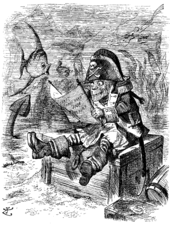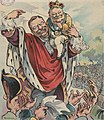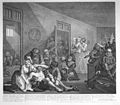Portal:Cartoon
The Cartoon Portal

A cartoon is a type of visual art that is typically drawn, frequently animated, in an unrealistic or semi-realistic style. The specific meaning has evolved, but the modern usage usually refers to either: an image or series of images intended for satire, caricature, or humor; or a motion picture that relies on a sequence of illustrations for its animation. Someone who creates cartoons in the first sense is called a cartoonist, and in the second sense they are usually called an animator.
The concept originated in the Middle Ages, and first described a preparatory drawing for a piece of art, such as a painting, fresco, tapestry, or stained glass window. In the 19th century, beginning in Punch magazine in 1843, cartoon came to refer – ironically at first – to humorous artworks in magazines and newspapers. Then it also was used for political cartoons and comic strips. When the medium developed, in the early 20th century, it began to refer to animated films that resembled print cartoons. (Full article...)

In print media, a cartoon is a drawing or series of drawings, usually humorous in intent. This usage dates from 1843, when Punch magazine applied the term to satirical drawings in its pages,[1] particularly sketches by John Leech.[2] The first of these parodied the preparatory cartoons for grand historical frescoes in the then-new Palace of Westminster in London.[3]

Selected article -
"North by North Quahog" is the first episode of season four of Family Guy, following the revival of the series three years after its cancellation in 2002. Directed by Peter Shin and written by series creator Seth MacFarlane (pictured), the episode was first broadcast on May 1, 2005, on FOX. In "North by North Quahog", the show's main characters Peter and Lois Griffin go on a second honeymoon to spice up their marriage, but are eventually chased by Mel Gibson after Peter steals the sequel to The Passion of the Christ from Gibson's private hotel room. Meanwhile, their anthropomorphic dog Brian and their infant son Stewie take care of their teenage kids Chris and Meg. Family Guy had been canceled in 2002 due to low ratings, but was revived by FOX after reruns on Adult Swim became the network's most watched program, and more than three million DVDs of the show were sold. Much of the plot and many of the technical aspects of the episode, as well as the title, are direct parodies of the 1959 Alfred Hitchcock movie North by Northwest. The episode was watched by 12 million viewers and received a Primetime Emmy Award nomination for Outstanding Animated Program (for Programming Less Than One Hour).
Selected character -
SpongeBob SquarePants is a fictional character in the animated television series SpongeBob SquarePants. He is voiced by Tom Kenny (pictured) and first appeared on television in the series' pilot episode "Help Wanted" on May 1, 1999. SpongeBob was created and designed by cartoonist Stephen Hillenburg shortly after the cancellation of Rocko's Modern Life in 1996. Hillenburg compared the concept to Laurel and Hardy and Pee-wee Herman. As he drew the character, he decided that a "squeaky-clean square" (like a kitchen sponge) fits the concept. His name is derived from "Bob the Sponge", the host of Hillenburg's comic strip The Intertidal Zone that he originally drew in 1989 while studying at the California Institute of Arts. SpongeBob is a naïve and goofy sea sponge who works as a fry cook in the fictional underwater town of Bikini Bottom. SpongeBob has achieved popularity with both children and adults, though he has been involved in public controversy.
Did you know... -
- ...that Star Trek: Countdown, a comic book prequel to the 2009 film Star Trek, is also a sequel to the 2002 film Star Trek Nemesis?
- ...that the Young Justice episode "Independence Day" introduces a younger version of the DC Universe?
- ...that Morning Funnies was a fruit-flavored breakfast cereal featuring comic strip characters including Dennis the Menace, Hägar the Horrible, and Funky Winkerbean on the box?
- ...that Ed, Edd n Eddy's TV movie series finale, Ed, Edd n Eddy's Big Picture Show, premiered on November 8, 2009, and achieved high ratings success for Cartoon Network?
Selected list -
There have been 131 episodes of Ed, Edd n Eddy, an animated comedy television series created by Danny Antonucci and produced by Canada-based a.k.a. Cartoon. The series debuted on Cartoon Network in the United States on January 4, 1999, and ended on November 8, 2009, with the premiere of the series finale film Ed, Edd n Eddy's Big Picture Show. The series was originally planned to air for four seasons; however, Cartoon Network ordered two additional seasons and three holiday-themed specials as a result of its popularity. Reruns continue to air on Cartoon Network, including airing as part of the revived block Cartoon Planet. The series revolves around three adolescent boys collectively known as "the Eds", who live in a suburban cul-de-sac. Unofficially led by Eddy, the Eds constantly try to scam the fellow cul-de-sac children in order to purchase jawbreakers. The Eds' plans usually fail and leave them in various predicaments. The award-winning series garnered generally positive reviews, and remains the longest running original Cartoon Network series and Canadian-made animated series to date.
General images -
Selected biography -
Dan Castellaneta (born October 29, 1957) is an American film, theatre and television actor, comedian, voice artist, singer and television writer. Noted for his long-running role as Homer Simpson on the animated television series The Simpsons, he also voices many other characters on The Simpsons, including Abraham "Grampa" Simpson, Barney Gumble, Krusty the Clown, Groundskeeper Willie, Mayor Quimby and Hans Moleman. Born in the Chicago suburb of Oak Park, Illinois, Castellaneta started taking acting classes at a young age. He would listen to his father's comedy records and do impressions of the artists. He was cast in The Tracey Ullman Show, which debuted in 1987. The Tracey Ullman Show included a series of animated shorts about a dysfunctional family. Voices were needed for the shorts, so the producers decided to ask Castellaneta to voice Homer. His voice for the character started out as a loose impression of Walter Matthau, but later evolved into a more robust voice. The shorts would eventually be spun off into The Simpsons. Castellaneta has won four Primetime Emmy Awards for Outstanding Voice-Over Performance for his work on the show as well as an Annie Award for Outstanding Individual Achievement in the Field of Animation in 1993.
Subcategories
WikiProjects
- Main projects
- Arts • Animation • Comics • Entertainment • Visual arts
- Related Projects
- Anime and manga • Biography • Film • Fictional characters • Media franchises • Music • Television • Video games
Selected quote -
Topics
- Comic book
- Comic strip
- Digital comics
- Graphic novel
- Mobile comic
- Motion comics
- Trade paperback
- Webcomic
- Animator
- Animation director
- Animation studios
- Animation film festivals
- Feature-length films
- Short films
- Television series
- Computer-animated films
- Stop-motion films
- Traditional animation
- Limited animation
- Rotoscoping
- Stop Motion
- Clay
- Cutout
- Graphic
- Model
- Object
- Pixilation
- Puppetoon
- Computer animation
- Flash animation
- PowerPoint animation
- SVG animation
- Cel-shaded animation
- Crowd simulation
- Morph target animation
- Motion capture
- Non-photorealistic rendering
- Skeletal animation
Things you can do

- Requested articles: Fenwick (comics), Khimaera (comics), Mutant Underground Support Engine, Bruce J. Hawker, Marc Dacier, Hultrasson, Frankenstein Comics, Dave Johnson (comics), Paco Medina, Dappere Dodo, New Adventures of the Space Explorers, Habatales, Musical Box, Foo-Foo (TV series), Bonne nuit les petits, The Adventures of Lariat Sam, More...
- Images and photos needed: Request images that are needed from Wikipedia requested images of comics and animation to included in each articles.
- Stubs: Work on stubs in articles in Comics and Animation stubs.
- Infobox: Add infobox that are needed from Category:Comics articles without infoboxes and Category:Animation articles needing infoboxes in articles.
- Deletion sorting: Please see the collection of discussions on the deletion of articles related to comics and animation - compiled by WikiProject Deletion sorting
Related portals
Associated Wikimedia
The following Wikimedia Foundation sister projects provide more on this subject:
-
Commons
Free media repository -
Wikibooks
Free textbooks and manuals -
Wikidata
Free knowledge base -
Wikinews
Free-content news -
Wikiquote
Collection of quotations -
Wikisource
Free-content library -
Wikiversity
Free learning tools -
Wiktionary
Dictionary and thesaurus
More portals
Sources
- ^ Punch.co.uk. "History of the Cartoon". Archived from the original on 2007-11-11. Retrieved 2007-11-01.
- ^ Adler & Hill 2008, p. 30.
- ^ "Substance and Shadow: Original Editorial Accompanying "Cartoon, No. I"". Victorian web.org. Retrieved 29 October 2023.









































